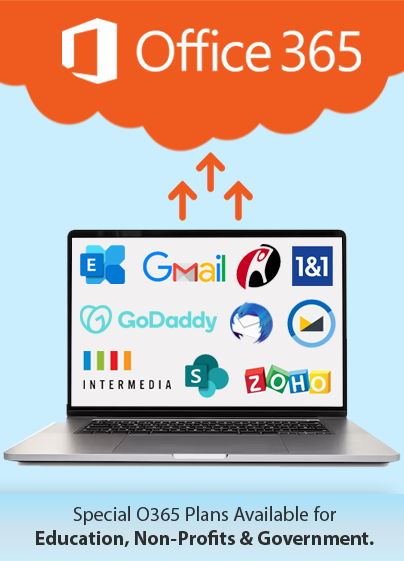Exchange Server vs Exchange Online: What Should You Choose?
Choosing a solution for business email is not simple. You need to look at various factors and constraints, compare them and weigh their importance, understand your tradeoffs, and finally, decide on your choice.
Today, several leading providers are offering business email solutions such as the likes of Microsoft (Microsoft Exchange Server and Exchange Online), Google (Gmail for Business), Amazon (Amazon SES), and Alibaba (Alibaba Mail).
When it comes to business email management, there are 3 possible scenarios; they have been explained below in detail with Microsoft’s products as a reference:
Physical Servers – a company that chooses to house their email servers on their own hardware would have to purchase their hardware (storage space, RAM, etc.) followed by software licenses for Windows Server as well as Microsoft Exchange Server (both of which would be running on the company’s hardware), and finally Microsoft would also charge a per-user client access fee.
Hosted Exchange – a company that chooses to proceed with the hosted exchange for business email management would approach a Cloud Solutions Provider (CSP), state their requirements, and subscribe to a monthly per-user based plan for hosted Exchange for receiving the control and flexibility of having their own email account at a fraction of the cost of an on-premises Exchange server. In this case, the Exchange email servers are located in CSP’s data centers.
Exchange Online – a company that wishes to subscribe to Microsoft Exchange Online can directly do so from Microsoft’s website; here, Exchange Online is a cloud-based email SaaS offered by Microsoft. Compared to Hosted Exchange, the only difference here is that instead of a CSP hosting the company’s email servers, it would be Microsoft itself.
In this article, we shall discuss the differences between On-Premises Exchange Server and Exchange Online in detail, so if you are planning to shift from physical servers, you can identify the best of the two options (Exchange Server vs Exchange Online) for your business.
Microsoft Exchange Server vs Microsoft Exchange Online
Microsoft Exchange Online is based on Microsoft Exchange Server. However, they are two different products from Microsoft altogether despite their similarities. Therefore, it makes sense to understand how both they both differ.
- Microsoft Exchange Server is built on dedicated physical or virtual servers which require a lot of maintenance, while Microsoft Exchange Online is completely cloud-based.
- Microsoft Exchange Server needs both server licenses as well as client access licenses for employees to use the system. In contrast, Microsoft Exchange Online one only needs to pay the monthly amount as per their plan ($4/user/month for Exchange Online Plan 1 and $8/user/month for Exchange Online Plan 2).
- For organizations planning to migrate Exchange 2010 to Office 365, this difference becomes crucial. Since Exchange Online is cloud-based, there are no practical limits for its scalability. For instance, if a business purchases 100 licenses for 100 employees and then has to lay off 30 of them, their client access licenses cannot be returned as they have already been consumed. Microsoft Exchange Online can scale as well as descale without such problems as a business only needs to pay the monthly subscription fee depending on the number of current users at their company.
Exchange Server Hosting
Essentially, Hosted Exchange refers to where the client’s email servers are hosted by another party (usually a service provider). Consider this example:
Company ‘ABC’ has decided to discontinue its existing physical, on-premise servers due to the exorbitant costs and space constraints. The management of the company has decided to move its business email management to the cloud by outsourcing it; the company decides to proceed with the option of Hosted Exchange as it is like having its own physical, on-premise servers, albeit with some limitations. Company ‘ABC’ then picks a cloud solutions provider (CSP) that can offer it Hosted Exchange services as per its requirements, then the CSP helps Company ‘ABC’ with migration of the mailboxes to the cloud and the organization continues to operate as before in exchange for a nominal monthly fee paid to the CSP in return for its Hosted Exchange services.
The cloud solutions provider (CSP) handles the entire IT infrastructure management as the client’s data is stored in its data centers. Hence, the company does not need to worry about the numerous costs associated with setting up and managing physical servers. At the same time, they have full control over the data and some choice of the server application version, preferred configuration options, and so on.
Exchange Online
Exchange Online or Microsoft Exchange Online is the cloud-based email solution that offers clients with the functionality of Exchange Server, but their data is hosted in Microsoft’s data centers which are managed by their certified professionals. Consider this example:
Company ‘XYZ’ wants to discontinue their physical servers as they have become too expensive to maintain. After some research, Company ‘XYZ’ decides to switch to Microsoft Exchange Online which is a business email SaaS offered by Microsoft. Company XYZ only needs to determine the monthly number of employees who would be requiring the Exchange Online email access because on that basis Microsoft will bill them. However, all other aspects starting from the server application version to configuration options are decided and handled by Microsoft in their entirety with zero involvement of Company XYZ whatsoever.
Ultimately, both Hosted Exchange and Exchange Online have their own advantages and drawbacks. It all depends on your company’s requirements.
If you cannot decide what to choose between Hosted Exchange or Exchange Online, our Microsoft-certified Exchange experts will help you find the right solution after analyzing your IT infrastructure and business requirements. Contact us today!
Apps4Rent – Tier 1 Office 365 Cloud Solution Provider
